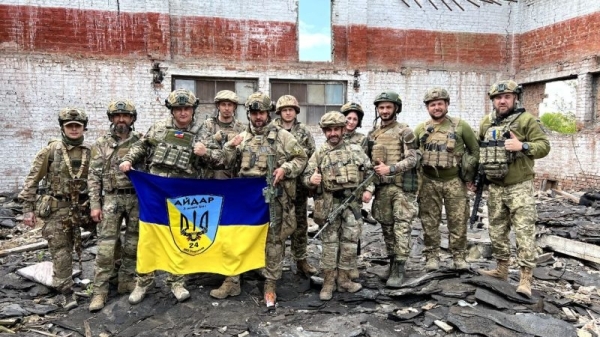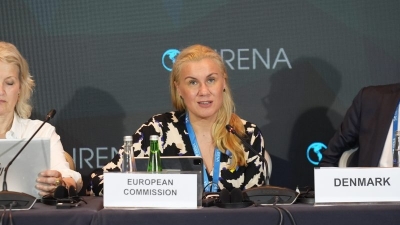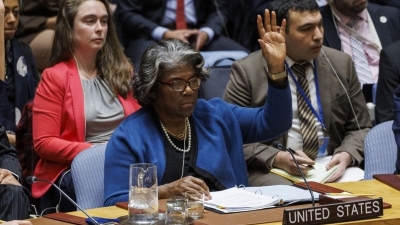Russian forces in retreat near Bakhmut ‘mousetrap’

The Ukrainian military and Russia’s Wagner private army both reported further Russian retreats around the city of Bakhmut on Thursday (18 May), as Kyiv pressed on with its biggest advance for six months ahead of a planned counteroffensive.
Ukrainian troops near the front line said Russia was bombarding access roads to slow the Ukrainian assault, which has shifted momentum after months of slow Russian gains in Europe’s deadliest ground combat since World War Two.
“Now, for the most part, as we have started to advance, they are shelling all the routes to front positions, so our armoured vehicles can’t deliver more infantry, ammunition and other things,” said Petro Podaru, commander of a Ukrainian artillery unit.
Ukraine’s military said troops had advanced in places by more than a mile. Its forces had been on the defensive for half a year, weathering a huge offensive by Moscow that saw only slow gains.
NEW: Ukrainian forces seized the tactical initiative & made tactically significant gains around #Bakhmut in counter-attack operations on May 18. These operations are part of localized UKR counter-attacks & do not reflect the start of a major new operation. https://t.co/x4d8VUsgOm pic.twitter.com/fzgFtQ0qNE
— ISW (@TheStudyofWar) May 19, 2023
“Despite the fact that our units do not have an advantage in equipment … and personnel, they have continued to advance on the flanks, and covered a distance of 150 to 1,700 metres (1.1 miles),” military spokesperson Serhiy Cherevatyi said in televised comments.
Ukraine’s gains have been accompanied by a deepening public split within Russia’s forces between Wagner, which has led the Bakhmut campaign, and the regular Russian military.
The blasted ruins of Bakhmut, described by both sides as a “meat grinder”, would be Moscow’s only prize for its huge winter offensive that failed elsewhere along the front.
Kyiv says it has launched local advances around Bakhmut as a prelude to an upcoming big counteroffensive that it hopes will turn the tide against Russia’s 15-month-old invasion.
Wagner boss Yevgeny Prigozhin says his forces inside Bakhmut itself are still advancing, on the cusp of pushing Ukrainian troops out of their last foothold in the built-up area on the city’s western outskirts.
But he accuses commanders of Russia’s regular forces of abandoning ground north and south of the city, raising the risk of troops inside being encircled.
“Unfortunately, units of the Russian Defence Ministry have withdrawn up to 570 metres (1,880 feet) to the north of Bakhmut, exposing our flanks,” Prigozhin said in his latest voice message on Thursday.
“I am appealing to the top leadership of the Ministry of Defence – publicly – because my letters are not being read,” Prigozhin said, addressing Defence Minister Sergei Shoigu and Chief of the General Staff Valery Gerasimov.
“Please do not give up the flanks.”
The Russian defence ministry has acknowledged some withdrawals from positions near Bakhmut over the past week but denies Prigozhin’s assertions that flanks are crumbling, or that it has withheld ammunition from Wagner.
Falling into ‘the mousetrap’
Ukrainian Deputy Defence Minister Hanna Maliar said Russia had pushed reserves into Bakhmut and battles had raged in its northern and southern suburbs all day. But the Russians had been repelled and her forces had advanced, by her estimate by about a kilometre in some areas.
“We are buying time for certain planned actions,” Maliar said on her Telegram channel. Reuters could not confirm her account.
Kyiv says its tactic around Bakhmut is to draw Russian forces into the city, so as to weaken Russia’s front line defences elsewhere ahead of Kyiv’s planned counterassault.
“Wagner troops climbed into Bakhmut like rats into a mousetrap,” Oleksander Syrskyi, commander of Ukraine’s ground forces, told troops at the Bakhmut front in video he released this week on social media.
“Using the principle of active defence, we resort to counteroffensive actions in some directions near Bakhmut. The enemy has more resources, but we are destroying his plans.”
With Kyiv’s counteroffensive looming, Russia has resumed missile and drone strikes across Ukraine this month after a near two-month lull. Waves of attacks now come several times a week, the most intense pace of the war.
On Thursday, air raid sirens sounded overnight, black smoke filled the sky over Kyiv and one person was reported killed in the southern city of Odesa. Ukraine said it shot down 29 of 30 incoming missiles. Moscow claimed to have hit military targets.
Russia has also been experiencing attacks and explosions both in Ukrainian territory it controls and in Russian territory near the border. Officials in Russian-occupied Crimea reported a freight train had been derailed overnight by “interference”. Kyiv never confirms any role in incidents there.
On the diplomatic front, leaders of the G7 group of big developed countries were meeting in Japan where they are expected to unveil tighter measures to close off Russia’s opportunities to bypass financial sanctions.
US President Joe Biden and Japan’s Fumio Kishida met for talks in Hiroshima, aiming for closer cooperation in the face of both an unpredictable Russia and ascendant China.

Against Hiroshima’s sombre legacy, G7 grapples with Ukraine conflict
Leaders of the world’s advanced democracies were set to unleash new sanctions against Russia as they gathered for a Group of Seven (G7) summit in Japan’s Hiroshima, a symbolic backdrop for their efforts to make Moscow end the Ukraine war.
A US Senate aide and a defence official said on Thursday the Pentagon had overvalued US equipment it sent to Ukraine by around $3 billion, an error that opens up the possibility of more weapons being sent to Kyiv.
On Wednesday, Moscow agreed to a two-month extension of a deal safeguarding exports of Ukrainian grain from Black Sea ports despite the war. Russia had threatened to abandon the deal unless it received additional guarantees protecting its own grain and fertiliser exports.
However, a Ukrainian official said the corridor had not yet resumed, while Russia said more progress was needed to advance its interests.
Read more with EURACTIV




